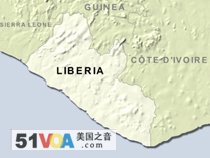Dakar
27 March 2009
 African military veterans are in Liberia for a program to help the government meet the needs of former fighters from the country's long civil war.
African military veterans are in Liberia for a program to help the government meet the needs of former fighters from the country's long civil war. Liberia's government hopes to benefit from the experience of other African nations that have successfully reintegrated former combatants into society.
Former interim president Amos Sawyer chairs Liberia's Governance Commission. He says the trauma of 14 years of civil war changed the way people look at the military.
"This war also brought people into the military who, in fact, were not disciplined. So there is a big job out there to even help us change the mentality of our people as to how we look at the military," he said.
Sawyer says Liberia's new army is modeling itself not on often ill-disciplined former combatants but on more professional soldiers. He says it is part of a process to help the public see that not everyone with a gun is a soldier and not all soldiers have a rebel mentality.
"We all have to do this thing together because if we don't the relationship between the public and the military will not be a congenial one," Sawyer said.
Former combatants demonstrated last year over delays in retirement benefits.
William Stephens was a captain in the Armed Forces of Liberia. He says President Ellen Johnson-Sirleaf's government unconstitutionally disbanded the former government army without consideration for the welfare of veterans.
"Our civil liberties have all been frozen in terms of the manner in which the government did disband the army," Stephens said.
One of the ways the government in Monrovia responded to former combatant complaints was to create a Veterans Bureau to better care for those who served. But even there, Stephens complains members of the former government army were not consulted.
"The government of Liberia had decided to form this Veterans Bureau when we were agitating with them without our awareness. We were not a partner accompanied during the passage of such bill." he said.
Dealing with such a large demobilization of fighters was a challenge faced by Nelson Mandela in post-apartheid South Africa. Lieutenant Colonel Evariston Tom Seeta works with South Africa's veterans bureau and is in Liberia to help reintegrate former fighters.
"You know a person, an idle hand which doesn't do anything becomes dangerous," he said.
Seeta says the Mandela government looked after demobilized fighters by helping them buy land to farm or get a loan to start a small business or learn a trade.
"Giving a person money today, that money gets finished. But we had to give them certain skills, and we introduced certain institutions whereby they could go for training in these institutions because most of them they didn't have any skills. What they knew is just to hold a gun," Seeta said.
Some 90,000 former fighters have been retrained. Former rebel Teah Jomah learned masonry.
"I am a professional builder. I build houses for people, and I get my money. And I am so happy I went through the process because now I am a useful citizen of this country. And I don't have to wait for a government job before getting my money. I do my own work and get my money, so I am so happy," Jomah said.
Seeta says Liberia can learn from South Africa's experience.
"These are people who have been out of society. By providing them with skills, that means they will go back to their societies and serve their own communities," Seeta said.
The World Bank, the United Nations, and the Liberian government have offered short-term employment for 60,000 former combatants. But most of the more than 100,000 former fighters disarmed since the end of the war in 2003 remain unemployed in a country where the United Nations estimates 85% of people are out of work.